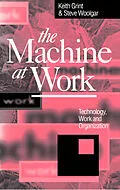This highly topical book is a concise and accessible account of the
relationship between technology and work. Firstly, it reviews and
critically assesses a variety of recent approaches to the social
and cultural dimensions of technology. Secondly, it examines the
implications of these new approaches for existing ideas about the
nature of technology and work organization.
At the core of much thinking about technology is the assumption
that the technical character and capacity of artefacts is given.
The enduring image of deus ex machina captures the idea that
it is the essential capacity 'within' a technology which, in the
end, accounts for the way we organize ourselves, our work and other
life experiences. Recent work in the sociology of technology, by
contrast, sets out relativist and constructivist accounts of
technology, which begin to challenge this central assumption.
The Machine at Work includes a reinterpretation of the
Luddites; a review of the social processes of development in
information technology; a reassessment of theories of the role of
technology in work; and an analysis of the common limitations of
some constructivist and feminist perspectives on technology. The
book argues that only a commitment to a particular conception of
constructivism enables the kind of radical rethinking about
technology and work relations that is needed.
This engaging and informative text will be of interest to
students in a range of subject areas - from sociology,
organizational theory and behaviour, to industrial relations,
management and business studies.
Autorentext
Keith Grint is Lecturer in Management Studies and Fellow in Organization Behaviour at Templeton College, Oxford. Steve Woolgar is Director of CRICT and Professor of Sociology at Brunel, University of West London.
Zusammenfassung
This highly topical book is a concise and accessible account of the relationship between technology and work. Firstly, it reviews and critically assesses a variety of recent approaches to the social and cultural dimensions of technology. Secondly, it examines the implications of these new approaches for existing ideas about the nature of technology and work organization.
At the core of much thinking about technology is the assumption that the technical character and capacity of artefacts is given. The enduring image of deus ex machina captures the idea that it is the essential capacity 'within' a technology which, in the end, accounts for the way we organize ourselves, our work and other life experiences. Recent work in the sociology of technology, by contrast, sets out relativist and constructivist accounts of technology, which begin to challenge this central assumption.
The Machine at Work includes a reinterpretation of the Luddites; a review of the social processes of development in information technology; a reassessment of theories of the role of technology in work; and an analysis of the common limitations of some constructivist and feminist perspectives on technology. The book argues that only a commitment to a particular conception of constructivism enables the kind of radical rethinking about technology and work relations that is needed.
This engaging and informative text will be of interest to students in a range of subject areas - from sociology, organizational theory and behaviour, to industrial relations, management and business studies.
Inhalt
Acknowledgements.
Introduction: Deus ex Machina. .
1. Theories of Technology.
2. The Luddites: Diablo Ex Machina. .
3. Configuring the User: Inventing New Technologies.
4. Some Failures of Nerve in Constructivist and Feminist Analyses of Technology.
5. Technology and Work Organizations.
6. What's Social about Being Shot?.
Notes.
References.
Index.
